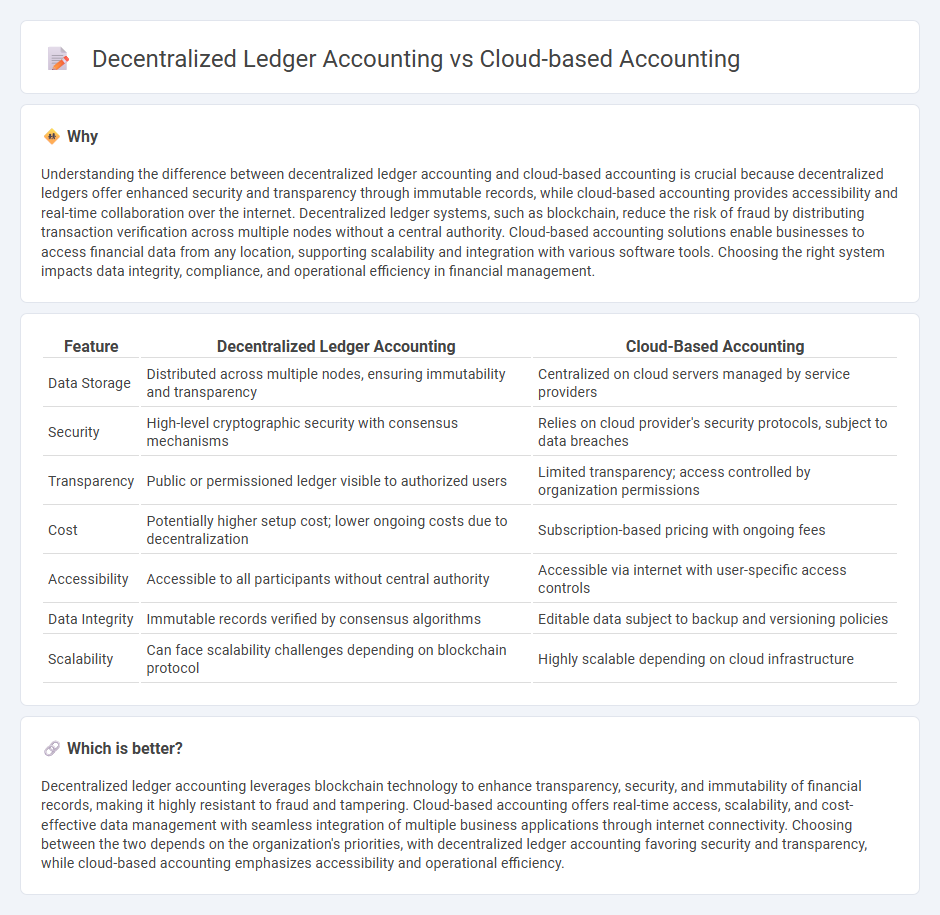
Decentralized ledger accounting leverages blockchain technology to provide immutable, transparent financial records, enhancing security and reducing the risk of data tampering. Cloud-based accounting offers scalable, real-time access to financial data through centralized servers, facilitating collaboration and automation for businesses of all sizes. Explore the key differences and benefits of these accounting systems to determine which suits your business needs.
Why it is important
Understanding the difference between decentralized ledger accounting and cloud-based accounting is crucial because decentralized ledgers offer enhanced security and transparency through immutable records, while cloud-based accounting provides accessibility and real-time collaboration over the internet. Decentralized ledger systems, such as blockchain, reduce the risk of fraud by distributing transaction verification across multiple nodes without a central authority. Cloud-based accounting solutions enable businesses to access financial data from any location, supporting scalability and integration with various software tools. Choosing the right system impacts data integrity, compliance, and operational efficiency in financial management.
Comparison Table
| Feature | Decentralized Ledger Accounting | Cloud-Based Accounting |
|---|---|---|
| Data Storage | Distributed across multiple nodes, ensuring immutability and transparency | Centralized on cloud servers managed by service providers |
| Security | High-level cryptographic security with consensus mechanisms | Relies on cloud provider's security protocols, subject to data breaches |
| Transparency | Public or permissioned ledger visible to authorized users | Limited transparency; access controlled by organization permissions |
| Cost | Potentially higher setup cost; lower ongoing costs due to decentralization | Subscription-based pricing with ongoing fees |
| Accessibility | Accessible to all participants without central authority | Accessible via internet with user-specific access controls |
| Data Integrity | Immutable records verified by consensus algorithms | Editable data subject to backup and versioning policies |
| Scalability | Can face scalability challenges depending on blockchain protocol | Highly scalable depending on cloud infrastructure |
Which is better?
Decentralized ledger accounting leverages blockchain technology to enhance transparency, security, and immutability of financial records, making it highly resistant to fraud and tampering. Cloud-based accounting offers real-time access, scalability, and cost-effective data management with seamless integration of multiple business applications through internet connectivity. Choosing between the two depends on the organization's priorities, with decentralized ledger accounting favoring security and transparency, while cloud-based accounting emphasizes accessibility and operational efficiency.
Connection
Decentralized ledger accounting leverages blockchain technology to ensure transparent, immutable financial records, enhancing trust and reducing fraud. Cloud-based accounting platforms integrate this decentralized ledger to provide real-time access, scalability, and streamlined collaboration for businesses. Together, they revolutionize financial management by combining secure data integrity with flexible, accessible accounting solutions.
Key Terms
Centralization vs. Decentralization
Cloud-based accounting relies on centralized servers managed by service providers to store financial data, offering ease of access and streamlined updates. Decentralized ledger accounting, such as blockchain technology, distributes transaction records across multiple nodes, enhancing transparency and security while reducing single points of failure. Explore the advantages and challenges of both systems to determine the best fit for your financial management needs.
Real-time Access
Cloud-based accounting systems provide real-time access to financial data through centralized servers, enabling businesses to monitor transactions instantly and streamline decision-making processes. Decentralized ledger accounting leverages blockchain technology to offer distributed, tamper-resistant records accessible simultaneously by multiple parties, ensuring transparency and trust without a single point of failure. Explore in-depth comparisons and benefits of each approach to determine the best fit for your organization's real-time accounting needs.
Immutable Ledger
Cloud-based accounting systems enable real-time access to financial data through centralized servers, offering scalability and ease of use. Decentralized ledger accounting employs blockchain technology to create an immutable ledger that ensures data integrity, transparency, and resistance to tampering. Discover how immutable ledger technology can transform your accounting practices by exploring in-depth advantages and use cases.
Source and External Links
Cloud Based Accounting: What is It and Why You Need It - Certinia - Cloud-based accounting is a Software-as-a-Service (SaaS) model that hosts accounting software on remote servers enabling real-time updates, accessibility from anywhere, collaboration across departments, and cost efficiency compared to traditional software.
Cloud Accounting: What It Is, How It Works And Its Benefits - Cloud accounting uses secure web-based software to streamline financial processes, offering easy multi-user access, data security with backups, and eliminating the need for desktop installations by enabling access from any device.
Cloud Accounting Basics: What It Is & Reasons to Use - NetSuite - Cloud accounting software built natively for the cloud provides businesses with integrated financial management, global compliance, automatic updates, and unified platforms that connect finance with other business functions, crucial for staying competitive today.
 dowidth.com
dowidth.com